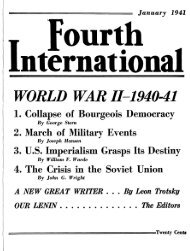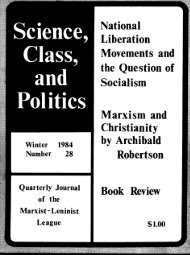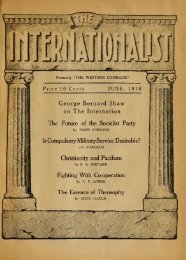The Stalin school of falsification - Marxists Internet Archive
The Stalin school of falsification - Marxists Internet Archive
The Stalin school of falsification - Marxists Internet Archive
You also want an ePaper? Increase the reach of your titles
YUMPU automatically turns print PDFs into web optimized ePapers that Google loves.
<strong>Stalin</strong> School <strong>of</strong> Falsification -- Chapter 11<br />
No refutations <strong>of</strong> this police report on <strong>Stalin</strong> made public by his partisans have appeared anywhere, so far<br />
as we know. It appears from the report that <strong>Stalin</strong> began his activities as a Menshevik.<br />
2. In 1905, <strong>Stalin</strong> was a member <strong>of</strong> the Bolsheviks and took an active part in the struggle. What were his<br />
views and actions in 1905? What were his views as to the character <strong>of</strong> the revolution and its<br />
perspectives? To our knowledge, there are no documents in circulation on this score. No articles,<br />
speeches or resolutions by <strong>Stalin</strong> have been reprinted. Why? Evidently because a republication <strong>of</strong> <strong>Stalin</strong>'s<br />
articles or letters for that period could only damage his political biography. <strong>The</strong>re is no other explanation<br />
for the stubborn oblivion that enshrouds the past <strong>of</strong> the "leader."<br />
3. In 1907, <strong>Stalin</strong> took part in the "expropriation" <strong>of</strong> the Tiflis bank. <strong>The</strong> Mensheviks, in the wake <strong>of</strong><br />
bourgeois philistines, have expressed no little indignation at the "conspiratorial" methods <strong>of</strong> Bolshevism,<br />
and its "anarcho-Blanquism." We can have only one attitude toward this indignation, namely, contmpt.<br />
His participation in a bold, even if a partial, blow dealt to the enemy can only do honor to the<br />
revolutionary resoluteness <strong>of</strong> <strong>Stalin</strong>. One can only be astonished, however, as to why this fact has been<br />
deleted in a cowardly manner from alt the <strong>of</strong>ficial biographies <strong>of</strong> <strong>Stalin</strong>? Was it done, perhaps, in the<br />
name <strong>of</strong> bureaucratic respectability? We venture to think not. <strong>The</strong> reasons are most probably political.<br />
For, while participation in an expropriation cannot in itself in any way compromise a revolutionist in the<br />
eyes <strong>of</strong> revolutionists, a false political evaluation <strong>of</strong> the then existing situation does compromise <strong>Stalin</strong> as<br />
a politician. Partial blows to the institutions <strong>of</strong> the enemy, including "treasuries," are compatible only<br />
with a mass <strong>of</strong>fensive, i.e., the upsurge <strong>of</strong> the revolution. With the masses in retreat, partial, isolated and<br />
partisan blows inevitably degenerate into adventures and lead to the demoralization <strong>of</strong> the party. In 1907,<br />
the revolution was receding, and the expropriations degenerated into adventures. In any case, <strong>Stalin</strong> gave<br />
pro<strong>of</strong> even in that period that he was incapable <strong>of</strong> distinguishing the ebb-tide from the flood-tide. He was<br />
to reveal this incapacity to orient himself politically on a broad scale more than once in the future<br />
(Esthonia, Bulgaria, Canton, the "Third Period").<br />
4. From the time <strong>of</strong> the first revolution, <strong>Stalin</strong> led the life <strong>of</strong> a pr<strong>of</strong>essional revolutionist. Jail, exiles,<br />
escapes. But for the entire period <strong>of</strong> reaction (1907-1911) we do not find a single document containing<br />
<strong>Stalin</strong>'s formulation <strong>of</strong> his own estimate <strong>of</strong> the situation and its perspectives. It is impossible for them not<br />
to have been preserved, even if only in the archives <strong>of</strong> the police department. Why have they not<br />
appeared in print? <strong>The</strong> reason is as clear as noonday: <strong>The</strong>y are <strong>of</strong> such nature as renders it impossible to<br />
strengthen the silly characterization <strong>of</strong> theoretical and political infallibility that the apparatus is creating<br />
for <strong>Stalin</strong>, i.e., for itself.<br />
5. Only a single letter pertaining to that period has appeared through an oversight in the press-and it<br />
wholly confirms our hypothesis.<br />
On January 24, 1911, <strong>Stalin</strong> wrote from exile to his friends, and this letter, that had been intercepted by<br />
the police department, was reprinted on December 28, 1925, by the self-same editorial board <strong>of</strong> Zarya<br />
Vostoka, none too rational in its zeal. Here is what <strong>Stalin</strong> wrote:<br />
"We have <strong>of</strong> course heard from abroad <strong>of</strong> the 'tempest in a teapot' there; the blocs between<br />
Lenin-Plekhanov, on the one hand, and between Trotsky-Martov-Bogdanov, on the other. <strong>The</strong> attitude <strong>of</strong><br />
the workers towards the first bloc is, so far as I know, favorable. But the workers are generally beginning<br />
to look with disdain on what's going on abroad:<br />
Let them climb the walls to their heart's content. So far as we ourselves are concerned, whoever holds<br />
http://www.marxists.org/archive/trotsky/works/1937-st2/sf11.htm (2 <strong>of</strong> 12) [06/06/2002 15:07:13]

















